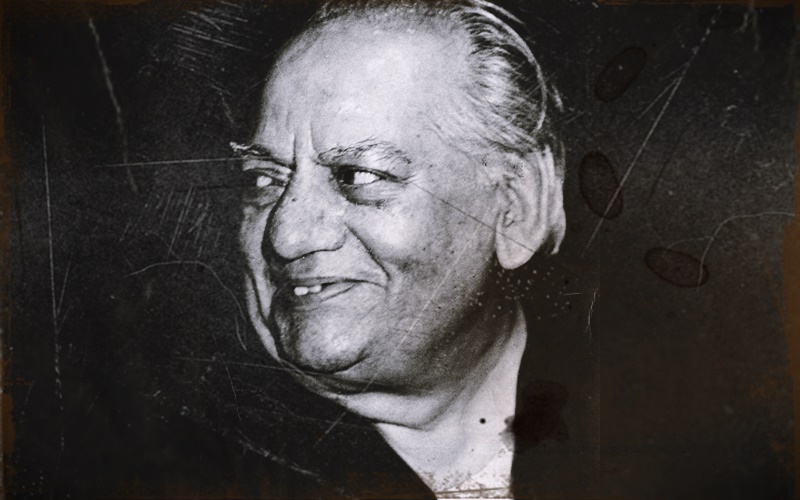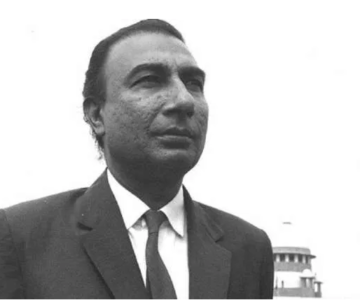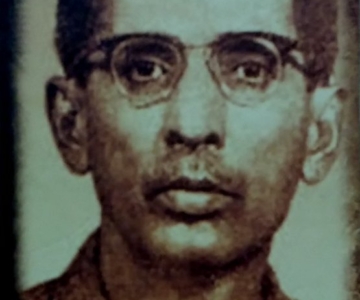Intisaab by Faiz Ahmed Faiz
Aaj ke naam
Aur
Aaj ke gham ke naam
Aaj ka gham ke hai zindagi ke bhare gulistan se khafa
Zard patton ka ban
Zard patton ka ban jo mera des hai
Dard ki anjuman jo mera des hai
Kilarkon ki afsurda jaanon ke naam
Kirmkhurda dilon aur zabaanon ke naam
Postmanon ke naam
Tange valon ke naam
Rail baanon ke naam
Kaarkhanon ke bhole jiyaalon ke naam
Badshaah-e-jahan, Vaali-e-masiva, Nayabullah-e-fil-arz, dehqaan ke naam
Jiske dhoron ko zaalim hanka le gaye
Jiski beti ko daakoo utha le gaye
Haath bhar khet se ek angusht patwar ne kaat li hai
Dusri maliye ke bahane se sarkar ne kaat li hai
Jiski pag zor valon ki paon tale
Dhajjiyan ho gai hai
Un dukhi maaon ke naam
Raat mein jinke bacche bilakhte hain aur
Neend ki maar khaaye hue baazooaun se sambhalte nahin
Dukh bataate nahin
Minnaton zaariyon se behelte nahin
Un hasinaon ke naam
Jinki aankhon ke gul
Chilmanon aur dareechon ki belon pe bekaar khil khil ke
Murjha gaye hain
Un byahtaon ke naam
Jinke badan
Be-muhabbat riyakaar sejon pe saj-saj ke ukta gaye hain
Bevaon ke naam
Katriyon aur galiyon, muhallon ke naam
Jinki napaak khashaak se chand raaton
Ko aa-aa ke karta hai aksar vazu
Jinke saayon se karti hai aah-o-bukaa
Aanchalon ki hina
Churiyon ki khanak
Kakulon ki mahak
Aarzoomand seenon ki apne paseene mein jalne ki boo.
Taalib-ilmon ke naam
Vo jo ashaab-e-tabl-o-alam
Ke daron par kitaab aur qalam
Ka taqazaa liye, hath phailaye
Pahuchen, magar laut kar ghar na aaye
Vo masoom jo bholpan mein
Vahan apne nanhe chraghon mein lau ki lagan
Le ke pahuchen, jahan
Bant rahe the ghata-top, be-ant raaton ke saaye.
Un aseeron ke naam
Jinke seenon mein farda ke shabtab gouhar
Jail-khanon ki shoreeda raaton ki sarsar mein
Jal jal ke anjum-numa ho gaye hain
Aane vaale dinon ke safiron ke naam
Vo jo khushboo-e-gul ki tarah
Apne paigham par khud fida ho gaye hain
Translation below
Dedication
In the name of this day
And
In the name of this day’s sorrow:
Sorrow that stands, disdaining the blossoming garden of Life,
Like a forest of dying leaves
A forest of dying leaves that is my country
An assembly of pain that is my country
In the name of the sad lives of clerks,
In the name of the worm-eaten hearts and the worm-eaten tongues
In the name of the postmen
In the name of the coachmen
In the name of the railway workers
In the name of the workers in the factories
In the name of him who is Emperor of the Universe, Lord of All Things,
Representative of God on Earth,
The farmer
Whose livestock has been stolen by tyrants,
Whose daughter has been abducted by bandits
Who has lost, from his hand’s breadth of land,
One finger to the record keeper
And another to the government as tax,
And whose very feet have been trampled to shreds
Under the footsteps of the powerful.
In the name of those sad mothers
Whose children cry out in the night
And will not be silenced by the defeated arms of sleep,
Who will not say what saddens them
Or be consoled by tears or entreaties.
In the name of those beauties
The flowers of whose eyes
Blossomed from every curtain and balcony
And withered away in waiting.
In the name of those wives
Whose unloved bodies
Have grown tired of the treachery of beds
In the name of the widows
In the name of neighbourhoods
Whose scattered garbage the moon
Blesses every night,
And from whose shadows cries out
The fragrance of veils
The tinkling of bangles
The scent of loosened hair
The smell of passionate bodies burning in their own sweat.
In the name of students
Who went to the masters of drums and banners
Prostrating themselves on doorsteps
With their books and pens
Praying, with open arms, to be heard,
But never returned.
Those innocents, who, in their naivete
Took their tiny lamps,
Their candle flames of hope, to where
The shadows of endless nights were being given out.
In the name of those prisoners
In whose breasts the shining gem of the future
Burns, polished by the noise of the jailer’s night,
To a star like radiance.
In the name of those harbingers of the days to come
Who, like the flower with its scent,
Have become enamoured of their own message.
There are some poems that have an anthem-like, declamatory quality. Poems that demand not so much to be read aloud as to be shouted into microphones, fed line by hungry line to some roaring mob that raises its fists high in support after every stanza. Poems that seem addressed, not to a single person, but to the People. Ginsberg’s Howl is like that. Gil Scott-Heron’s The Revolution will not be televised is like that.
And then there’s Faiz’s Intisaab. This is a marching, singing paean of a poem, at once heroic and sorrowful, at once incantatory and delicate. There are some unforgettable lines here (Zard patton ka ban jo mera des hai / Dard ki anjuman jo mera des hai) and some beautiful images (Jinki napaak khashaak se chaand raaton / Ko aa-aa kar karta hai aksar vazu) but the overall effect is of being swept up in the urgency of a historical moment, in the tidal wave of an entire people and their determination to stand firm against suffering, stand firm against oppression. This is a poem whose every line screams Revolution.
Politics and poetry do not, in general, go well together. Which is not to say that there aren’t good, even great, political poems; only that the rawness and stridency that makes for good politics doesn’t always fit comfortably with more poetic aims. There are exceptions, of course, but poems with a ‘message’ often end up sacrificing poetic merit for political momentum, so that they remain memorable not so much for their poetry per se but for the protest they contain. This is emphatically not true of Intisaab. This is a poem that is as political as you can get, that fairly overflows with attitude, and yet is also a sophisticated and stunningly visual lyrical work.
The poet I’m always reminded of, reading this, is Whitman. Think of the long enumerations from Song of Myself. Think of all the other songs – The Song of Occupations, the Song of Joys, The Song of the Open Road, Salute Au Monde!, I sing the Body Electric. There is the same rhythm of repetition, the same grandness of vision, the same deceptive simplicity. Faiz, like Whitman, writes from a well-spring of humanism, from a desire to celebrate the common people. Faiz, like Whitman, understands in his deeply democratic heart that it is here that true power lies, in the suffering of ordinary men and women, in the uncomplaining courage with which they bear whatever History thrusts upon them. Faiz, like Whitman, is a poet of his people. That is why he matters. That is why he will survive.
Writer’s Notes:
As should be obvious, my translation doesn’t do anywhere near justice to the poem. Frankly, there are things I just cannot translate. In the stanza about students, for instance, Faiz says kitab aur qalam / ka taqaaza liye, haath phailaye / pahuchen which I translate as “Prostrating themselves on doorsteps / with books and pens/ praying, with open arms, to be heard’. That doesn’t begin to do justice to the metaphor. Sanderson Beck writes (http://www.san.beck.org/20-1-BritishIndia1800-48.html):
In taqaza a man may restrain an equal or inferior from leaving his house or eating or compel him to sit in the sun until he makes some accommodation. If the debtor is a superior, the creditor may supplicate and lay on his doorstep, appealing to his honor and shame.
That’s just one example.
Courtesy JZ



